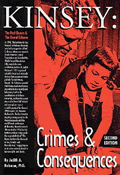Other
Kincaid
Articles:
By Cliff Kincaid
May
11, 2006
NewsWithViews.com
It certainly looked as if Time magazine had a big scoop. Director of National Intelligence John Negroponte, during an interview posted on April 12 with Time�s Michael Duffy and Timothy J. Burger, was said to have confirmed the existence of CIA �secret prisons,� as first reported by Dana Priest of the Washington Post in a controversial Pulitzer Prize-winning story. In big bold letters, as it appeared online, Time proclaimed: �Exclusive: John Negroponte says accused Al-Qaeda members will remain in secret prisons as long as �war on terror continues.�� But Time magazine now tells me that this is not what Negroponte actually said. In fact, Negroponte never even used the phrase �secret prisons� and the words never came up during the interview.
Those words, �secret prisons,� were inserted after the interview was completed, in order to make it seem as though Negroponte had said something that he had not.
Welcome to the world of modern journalism, where statements that are simply made up are attributed to powerful public officials.
Questioned about this, Time has issued a statement to AIM saying that �We did not mean to imply that those specific words were spoken but the context of the exchange was clear.�
Before we attempt to decipher this �clarification,� let us consider why Time engaged in this deception.
Even though Priest won a Pulitzer for her story about CIA �secret prisons� in Europe, there is still no proof of their existence. Priest herself says she doubts that the Europeans will turn up any evidence and so far they haven�t. The term �secret prisons� was clearly designed to suggest something evil about the practice of holding suspected terrorists and transferring them to various locations. It makes the war on terror�not the terrorists planning to attack America and our allies�into something sinister. In one interview, Priest didn�t take issue with the characterization of the �secret prisons� as �secret gulags.� The campaign has all the earmarks of disinformation.
Having chosen to use the term, �secret prisons,� Priest and her fellow-travelers in the media are now stuck with it. It�s not enough to brandish a Pulitzer. There ought to be some standard dictating that a story of this magnitude have some evidence backing it up, aside from the vague anonymous sources that made up the original Priest article. On this score, however, they have so far come up short. And this is why the Time interview of Negroponte was such a potential blockbuster.
Columnist Nat Hentoff certainly thought the interview was something new and dramatic and that Time meant exactly what it had reported. His column, �CIA Secret Prisons Exposed,� ran in the May 7 Village Voice. But Hentoff went further, calling them secret or hidden �gulags.� The Voice ran an illustration of a blindfolded prisoner behind bars. Since there are no pictures of any of these �secret prisons,� an illustration has to do.
Accepting the claim of �secret prisons� as a matter of fact, Hentoff seized on the Time magazine interview, reporting that �� Director of National Intelligence John Negroponte said the prisoners in these hidden gulags will be there as long as �the war on terror continues.� He added, in an April 12 Time interview: �I�m not sure I can tell you what the ultimate disposition of those detainees will be.��
It is important to read and understand exactly what Time magazine reported. It said, �Negroponte also told Time that three dozen or so of the worst al-Qaeda terrorists held in secret CIA prisons are likely to remain in captivity as long as the �war on terror continues.�� Doesn�t that sound like Negroponte explicitly referred to secret prisons? Or at least that he was asked about detainees in secret prisons? How could any reasonable person conclude anything other than that the phrase �secret prisons� was in the answer or the question, and that, as Hentoff said, Negroponte had confirmed the original Post article?
The trouble for Time is that the phrase �secret prisons� never came up in the interview. At least that is what Carl Kropf, Chief of Media Relations for the Office of the Director of National Intelligence, told me. He said the question and answer on this matter consisted of the following:
�Q: What is the end game for the three dozen or so high value detainees?
�A: I'm not going to get into that one, really. These people are being held, they�re bad actors, and as long as the situation continues, the situation with the war on terror continuing, I�m not sure I can tell you what the ultimate disposition of those detainees would be.�
Perhaps I�m not in the loop on the �new journalism,� but I can�t find anything in this exchange about �secret prisons.� Negroponte didn�t describe the nature of these facilities or their locations. He didn�t even imply that they were �prisons� in the sense that we understand the term. The subject just never came up. Instead, he talked about them being �held� somewhere.
It�s hardly surprising that terrorists are being held by the United States or our allies. After all, we are in a war for our survival. There is a war going on and terrorists are being killed or apprehended. Those being held somewhere are being interrogated to produce information to save American lives. But the media, including Time, have decided that they are being held in �secret prisons� or worse, and the implication is that we ought to be ashamed of what our government is doing to protect us. Continuing this story line, which is designed to incite our enemies and make America look bad, Time�s Duffy and Burger decided to put words in the mouth of Negroponte. It was big news, if only it were true.
Time now says they did not �mean to imply� that he had used those words �secret prisons.� Well, Hentoff�s column is a concrete example of how people would view the Time article as saying that Negroponte had confirmed their existence. That was my impression as well, and that is why I followed up with some questions that resulted in this house of cards falling down.
Time went on to say that �Negroponte�s comments appear to be the first open acknowledgement of the secret U.S. detention system and the fact that captives such as Khalid Shaikh Mohammad�involved in Sept. 11 or other major attacks on U.S. interests around the world�may be held indefinitely.�
The word �appear� was the key one. But how could he have appeared to say anything about secret prisons when the subject didn�t even come up in the interview? Time went further, saying his remarks were the �first open acknowledgement of the secret U.S. detention system��
This is strange and irresponsible journalism. First, the magazine uses the weasel word �appear.� Then it said that Negroponte�s comments constituted an �open acknowledgement� of their existence. How can it be that the comments �appear� to be referring to something that is quite �open� and direct? The obvious intent was to create the impression that the magazine had a big scoop. In fact, however, Negroponte really did not say much in that exchange. What he said, in effect, was that he wasn�t going to comment on the fate or location of those detainees. Not satisfied with that answer, Time decided to create something out of almost nothing. This is how Dana Priest won a Pulitzer.
|
Subscribe to the NewsWithViews Daily News Alerts! |
This convoluted terminology ultimately means that the magazine lied. There is no other way around it. Not only did Duffy and Burger put words in Negroponte�s mouth that he did not say, they embellished the significance of what he didn�t say. They produced two lies for the price of one. Now they claim they didn�t mean to imply what they wrote, and that the �context� was clear.
The
only �context� that is clear at this point is that they should correct
the record and apologize. That is the honest way to handle it.
� 2006 Cliff Kincaid - All Rights
Reserved
Cliff Kincaid, a veteran journalist and media critic, Cliff concentrated in journalism and communications at the University of Toledo, where he graduated with a Bachelor of Arts degree.
Cliff has written or co-authored nine books on media and cultural affairs and foreign policy issues.
Cliff has appeared on Hannity & Colmes, The O�Reilly
Factor, Crossfire and has been published in the Washington Post, Washington
Times, Chronicles, Human Events and Insight.
Web Site: www.AIM.org
E-Mail: kincaid@comcast.net
The word �appear� was the key one. But how could he have appeared to say
anything about secret prisons when the subject didn�t even come up in
the interview?












